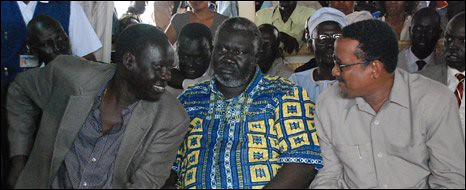
Officials from Abyei have agreed to an international ruling related to the status of the oil-producing area of the central African nation of Sudan. There has been an eruption of violence in Abyei since the elections., a photo by Pan-African News Wire File Photos on Flickr.
South Sudan: No Further Talks On Abyei and Heglig to Be Discussed With Sudan, Pagan Says
2 October 2012
Sudan Tribune
Juba/Khartoum — South Sudan said it would not hold further talks with Sudan on the disputed area of Abyei and vowed to discuss the fate of Heglig/Panthou in a bid to calm the growing discontent over the outcome of Addis Ababa talks.
The two countries' presidents, Omer Al-Bashir and Salva Kiir, on 27 September, have sealed a package of cooperation agreements in the Ethiopian capital, Addis Ababa, on oil, freedom of movement, trade and security on their common borders.
The agreements provided for creation of a temporary buffer zone between the perceived borderlines while the two parties will continue to discuss on Abyei referendum and their permanent borders as they failed to reach an agreement over the disputed areas including 14 Miles.
In a speech broadcast by South Sudan Television during a meeting of the Jakany Youth leadership council at Nyakuron Culture Centre on Monday evening in Juba, South Sudan chief negotiator Pagan Amum announced that his delegation would hold no further talks on Abyei with Sudan.
"The issue of Abyei is a finished case. There will be no more discussions. On our side as the government, we accepted the proposal by the mediators. President Salva Kiir Mayardit never hesitated but Sudan refused it", Pagan Amum, he said.
"As of now, there are only two issues. The issue of border demarcation and the issue of claimed and contested areas. These will be discussed in the next round of talks. We will engage Sudanese delegation so that we reach final agreement," Amum said.
He underscored that Heglig/Panthou had not been conceded to Sudan and it is one of the issues which the two sides would discuss in the next round of negotiation.
"Panthou [Heglig] is one of the claimed and contested areas whose status has not been resolved. If we cannot reach an agreement, we will go for arbitration," Amum said.
The two countries are expected to resume discussions over remaining issues within a month to finalise negotiations before mediation team submit a report to the African Union Peace and Security Council.
On Abyei, the two countries said committed to implement a protocol providing to hold a referendum to determine if the disputed area will remain in Sudan or join the new independent state of South Sudan.
However, the two parties failed to agree on the participation of the Misseriya pastoralists. While Juba says only Misseriya who resident permanently can vote, Khartoum raise the historical right of the nomads who claim the ownership of the area before the Ngok Dinka.
The mediation recently made a proposal supporting the position of South Sudanese government on the eligibility of Misseriya and called to hold a referendum in October2013. The proposition also asks Juba to give 20% of Abyei oil revenue to the South Kordofan state of Sudan to develop the area where the pastoralists remain during the rest of the year.
Juba immediately accepted the mediation's proposal and as expected Khartoum rejected it and reiterated its adherence to a previous plan the mediation proposed in November 2010 calling to divide the region if Juba rejects the participation of the nomads who reside for 185 days during the year.
SOUTH SUDAN PARLIAMENT TO ENDORSE THE AGREEMENTS
Lawmakers in the South Sudan's national legislature are recalled from their recess to reconvene and ratify the Addis Ababa's agreement with Sudan as opposition against the agreement gains momentum.
The MPs were supposed to remain on recess for three months from last month but because of the urgency of the situation they are asked to report themselves to Juba and convene an urgent sitting in order to ratify the agreement.
Members of the national legislature have also publicly expressed their dissatisfaction with the agreement, particularly on the borders and relationship between the two central banks of Sudan and South Sudan.
The governor of Northern Bahr el Ghazal state, Paul Malong Awan, was the first senior official to publicly express his opposition to the creation of the buffer zone which annexes 14 Miles to Sudan from his state.
Malong publicly announced in Juba on Saturday that he will make sure that the border agreement is not implemented in his presence.
The governor was echoed by a number of chiefs and intellectuals from the state who also described it a bad deal.
SUDAN REFUSES PAGAN STATEMENTS ON HEGLIG
In Khartoum the deals also are received with dissatisfaction by the Misseriya and Reizagat of 14 Miles. Also a far-right party, the Just Peace Forum (JPF) seeks to capitalize on the discontent.
JPF's daily newspaper Al-Intibaha was the only one to publish Pagan's statements on Heglig to support its positions hostile to any rapprochement with South Sudan.
The National Congress Party (NCP) quickly rejected Pagan's statements on Heglig saying that no further region would be added to the list of disputed areas in the talks between the two countries.
Head of NCP organisation sector Hamed Sidiq said that the talks will only concern five disputed areas agreed by the two parties and Heglig will not be among it.
He went further to reaffirm that any other statements are "worthless and baseless".
The African mediation did not accept to include Heglig in the list of disputed areas when the two parties started the talks under Resolution 2046.
No comments:
Post a Comment